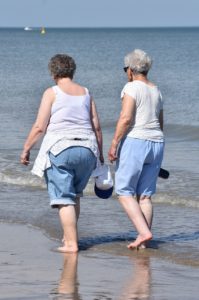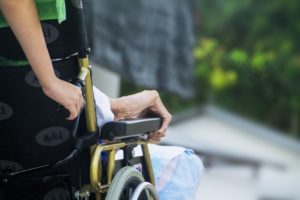 I had the same piano teacher since I was 7 until I was 18. She was already retired then. Until recently – as I approach my 40’s she was still stomping around the globe, going on holidays and generally enjoying life, and was the epitome of the active elder generation.
I had the same piano teacher since I was 7 until I was 18. She was already retired then. Until recently – as I approach my 40’s she was still stomping around the globe, going on holidays and generally enjoying life, and was the epitome of the active elder generation.
Earlier this year I received news that on a recent winter cruise she unfortunately contracted pneumonia with diabetic complications. And this, in her mid-90’s. Luckily she had some excellent family support around her and was recovering well, her main preoccupation was to “escape the nursing home”.
My dad was one of the people helping her out. The nursing home were of course very concerned about my piano teacher walking around with a diabetic leg ulcer, and of course were massively concerned about Falls. Fall prevention is perhaps one of the biggest things on the minds of people in intermediate and hospital care – and rightly so. There is a high mortality rate associated with falling – and if someone falls on your ward or your watch it is going to be *someones* fault. You get a fall on your ward, and all kinds of systems swing into action in terms of safeguarding etc.
The last thing you want on your watch is a Faller.
There are a number of programmes to reduce falls, they all take time, effort, money and staff. One of the best and most effective way to prevent falls is simply to discourage people to get up and walk… and if they do, make it as short a walk as possible.
This is not something that is “recommended” as such, but is, unfortunately one of the things that happens up and down the country. Fewer staff means that people get less time to get exercise that they might want and need – the staff generally go around making sure everyone gets at the very least, a basic level of care… to not do so would be unforgivable, but the things that take time – the luxuries, if you will – such as exercise are passed over in favour of making sure everyone gets the basics.
When my dad first walked in as a visitor, my piano teacher was sitting in a chair with her swollen leg swathed in bandages. From day one, she was able to walk, a bit wobbly, but insisted on walking herself to her bathroom … much to the concern of the staff. 5 weeks prior she had been wandering around town catching buses etc… here she was – post pneumonia and not really being able to exercise.
Not being one to take no for an answer (my piano teacher AND my dad) they basically started to get her to stand and wander around a bit – again much to the consternation of the staff. The most common thing was to hear “are you sure you don’t want a wheelchair?” Within 2 days she was getting up and down 2 flights of stairs and her swollen feet and legs had gone down considerably – so much so, that she could get her shoes on again and was enjoying going outside.

A weekend goes by, Dad goes back in – she hasn’t walked since Friday and has been wheeled around in a wheelchair – her feet have swollen up again and can no longer get her shoes on.
Now I’m not railing against the staff, who I’m sure are massively short-staffed and are running around doing the best they can – however, they tried to discourage my dad from helping her to get up and about -being concerned that it will be detrimental to her well-being…
They very much have the treatment for ulcers correct in terms of the elevated leg, but the OTHER half of treatment is walking regularly. Without that bit, legs get and stay swollen, people end up on water tablets and end up with polypharmacy and all kinds of complications.
Not good.
Where am I going with all this?
Falls prevention is indeed a good thing. We know that if someone falls and breaks a hip, there is a greater chance of mortality associated with it.
That being said, we also know that sitting down not doing anything also has a pretty high level of mortality as well… it’s just that people generally expire from generic causes, rather than specifically because they haven’t been active – whereas you can directly see a causal factor from falling, breaking a hip and then to death.
Also, if someone dies because they fell over in a nursing home, as mentioned above, normally there is fault to be found. If someone dies from sitting doing nowt, there isn’t. Hence another reason to let everyone sit and watch Jeremy Kyle.
Preventing people from falling is great. Don’t get me wrong. However, to stop patients from exercising, from walking and stopping them from getting better because of the fear of falls is not right, and is not something we should be encouraging.
No, I do not have a systemic answer, but in individual cases, there certainly is. If my dad, or someone like him comes in to give a hand to one of their circle – by helping them to exercise, to walk, or whatever, they should not be discouraged or chastised. Doing exercise is AS important, if not more so, than anything else they are doing.
The other side of the coin is this… according to a recent article in one of today’s papers about bed blocking, a 30 day stay in hospital for a patient over 80 is equivalent to ageing 10 years due to loss of muscle tone…. So without reintroducing some kind of walking, some kind of exercise, these patients are potentially losing their independence.
If exercise was a pill, we’d all be taking it.

Patients should not be denied treatment, and so they should not be denied exercise. Unfortunately, reduced funding, reduced staffing and generally reduced ability to supervise and create specific sessions means it is easier and “safer” to just let people be inactive.




